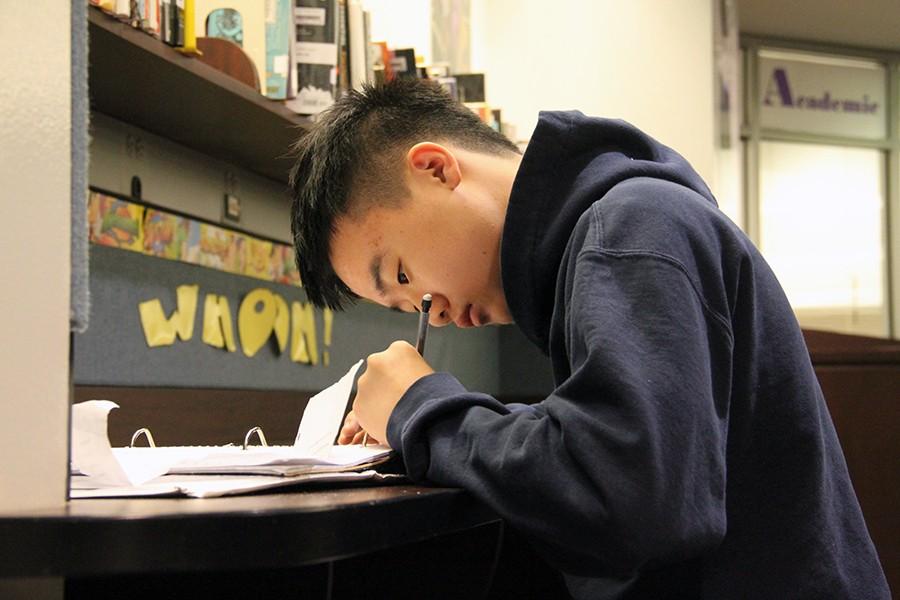Consistency in the library
April 10, 2015
As technology becomes increasingly mainstream in daily life, libraries are adapting to the technological advances and changing the format and services they offer. While the traditional idea of a library is becoming more obsolete, students, staff and librarians agree libraries will continue to be helpful, especially as they meet new consumer needs.
Like most public libraries, the BVNW school library is adapting to changes by constantly adjusting its functions. BVNW librarian Mary McCabe said the librarians are currently planning on discarding dated reference books and creating more classroom space.
According to McCabe, the information provided by those reference books are available online, and by removing those big books, there will be more room for teaching areas, which will benefit both teachers and students.
According to LeeAnn Blazen, the assistant manager of the Blue Valley and Spring Hill branches of the Johnson County Library system, another change occuring in libraries is the collection of books. She said although the collection of books has changed because of technology, there is still a demand for print books.
“We’re trying to find that balance between what we’re collecting electronically and what we’re collecting for physical books,” Blazen said.
Blazen said the drastic advances of technology, however, did not affect the population visiting libraries. She said libraries will always have value in the services and environment they offer the community.
“You’re isolated when you’re at home, and we all have the need to connect with people,” Blazen said. “[The library] is a place that people can come, meet with other people, engage with people, attend programs [and] get the information that they want, but not just a screen on computer.”
Junior Zoe Gargesh, who goes to Johnson County Library often for studying, said she is able to concentrate, and the library offers a good environment for her to study with her friends as well.
“Everyone [at the libarary] is also studying,” Gargesh said. “It’s a good environment for people to work and [the library is] a good source for books and computers, and all the resources that people may need.”
McCabe said, databases are one of the resources that make information more up-to-date so that students and teachers can be informed immediately if studies are revised. She said they are also more effective than books.
“We continue to always evaluate new databases that are available to provide all the students here with a cross-section of information in all of the different curricular areas and that are certainly more currently updated than good sources than books we might have bought 20 years ago,” McCabe said.
With the advancing technologies, McCabe said the role of librarians has changed, because instead of seeking help with looking for books, the public now reaches out for help on the usage of technology and navigating information.
“I think that just because technology means you can Google something, it doesn’t necessarily mean you’re getting the best information,” McCabe said. “So there is a great value in having librarians guide you to the most quality information for whatever topic you’re doing research on.”
According to Blazen, libraries have an educational value that cannot be ignored by the public. She said the Johnson County Library provides language learning, conversational classes, children’s story time, Makers’ Space, which provides children a place to create, and often make changes based on what the public is interested in.
Likewise, chemistry teacher Nanet Sula, who goes to library about three times a week for tutoring chemistry students, said the library is a place free of distraction.
“It’s a location where we don’t have a lot of distractions from other family members or pets or things like that,” Sula said. “It’s a place where we can get work done and have a table to work at.”
She also said she noticed that more adults are in the library due to Internet usage, which she said is completely different from her childhood experience.
“When I was little, we didn’t have Internet,” Sula said. “You went to the library to get books, or you go to the library, as a little kid, for story hour – things like that.”
According to Sula, the technological changes add more diversity to the library, so that a wide range of students, from little kids with their parents to college students and adults nowadays are using library. She also said borrowing books is an indispensable part of the library.
“To me, if I buy a book and read it once, I’m done with it, so I rarely buy any books,” Sula said. “So checking out from the library is a much better option for me.”
McCabe said libraries provide people who do not have computers at home an access to the Internet, as well as providing communities with spaces for learning and exploring.
“In the United States, the demand for education for all of our public and freedom of information and access to information is the basic foundation of our country,” Blazen said. “We fill that gap, or access the information for the public.”
The future of libraries is unknown, but Gargesh said people will likely not abandon them, because they adapt to changes, and at the same time, she hopes more small areas will be provided at the Johnson County Public Library for people to work.
Blazen also said she envisions the future positively and puts faith into the future of libraries.
“I’m excited about changes, because we want to be innovative, and provide what people are wanting, be that bridge between the past and present and future,” Blazen said.







